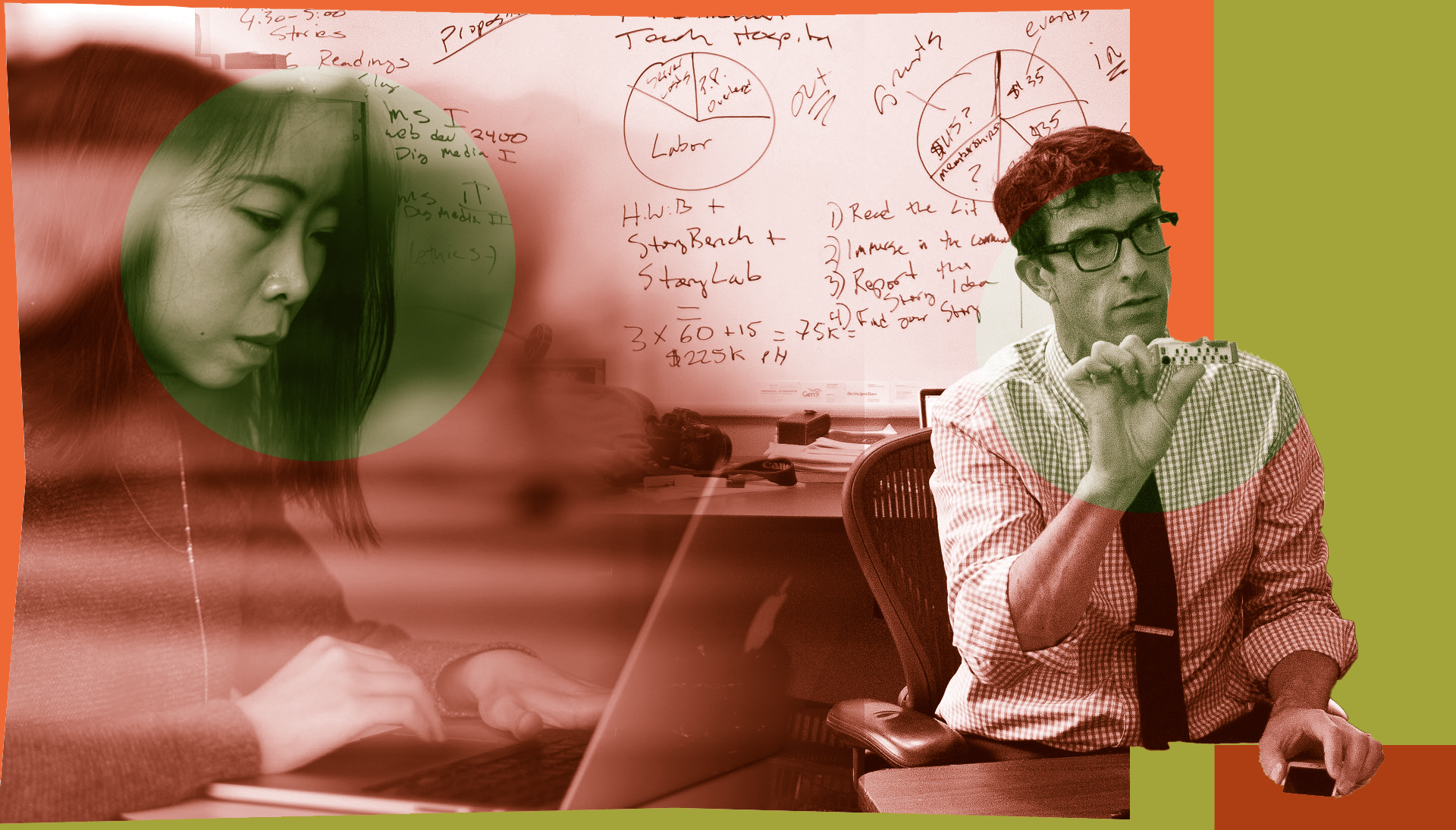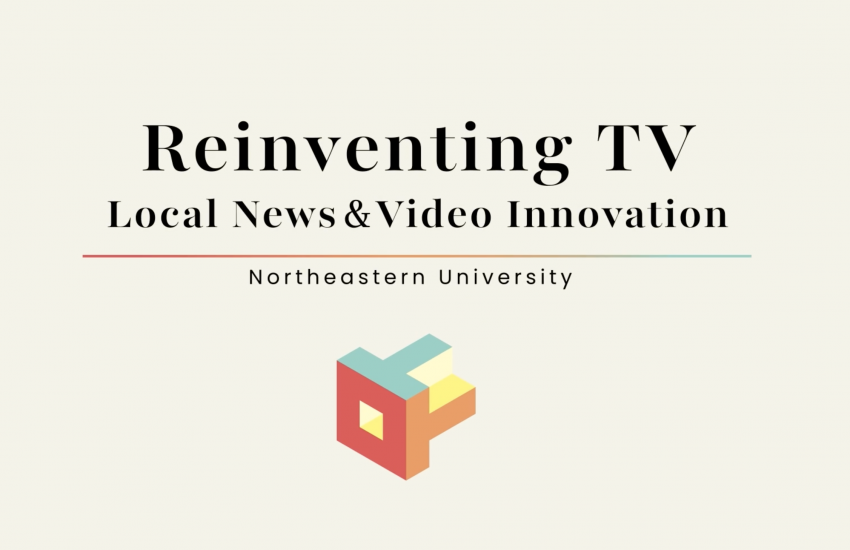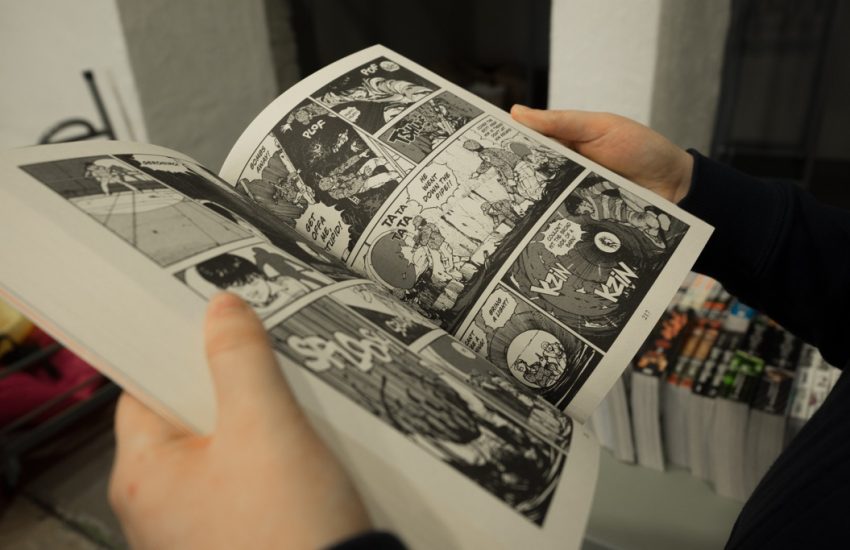Storytelling + STEM!: Northeastern’s new Master of Science (M.S.) in Media Innovation & Data Communication
For years here at Storybench, we’ve been exploring what you might call the “science of stories.” It can seem a paradox: How can something so human as storytelling — so subjective, so dependent on context, so humanistic — be something that can be reduced to a few underlying scientific theories or principles?
OK, perhaps a “science of stories” is just aspirational, but we keep trying anyway to figure out what makes stories compelling. It’s simply our passion here at Northeastern.
Our faculty and students have been going “under the hood” of hundreds of digital storytelling efforts, across news media, journalism, data visualization, animation, video and podcasting, and the broader ecosystem of digital innovators trying to communicate. We’ve been part of a growing movement in academia and industry studying narrative and narrative strategies (and subfields such as data storytelling, embodied in our Co-Lab for Data Impact).
After years of making our work both a public, open-source effort through the Storybench project and an educational one through our Media Innovation track program, we’re pleased to announce Northeastern University’s new:
Master of Science (M.S.) in Media Innovation & Data Communication
The degree has an official STEM (Science, Technology, Engineering, and Mathematics) designation, giving it enduring value in the digital economy and special status for those looking to work in the United States after completing the degree (STEM-OPT).
We believe this is an ideal graduate degree for the 21st century: Positioned at the intersection of the humanities and the sciences; and focused on how to blend the latest tools and technologies with a relentless focus on moving audiences to engage, dive in, change their mind, and take action. Graduates gain crucial fluencies for a data-driven world, and the degree is friendly to those with no coding or technical background. (Come, humanities majors — we’re ready to help you take the deep knowledge you have and translate it to the worlds of digital and data!)
Overall, the degree is consistent with Northeastern’s emphasis on experiential education and innovation. And it speaks to many of the themes embedded in the concept of “humanics” — an idea our university leadership has explored in depth.
As a matter of practice, we do a variety of things. Sometimes we explore new technologies and evaluate their strengths and weaknesses. Sometimes we code, or cut videos or podcasts. Sometimes we interview and do in-depth journalism in the field. And sometimes we do crazy stuff, like visualize all of the immigration data for the United States as a set of colorful tree rings (we won a global award for this project, led by Prof. Pedro Cruz, who teaches visualization and design courses)…
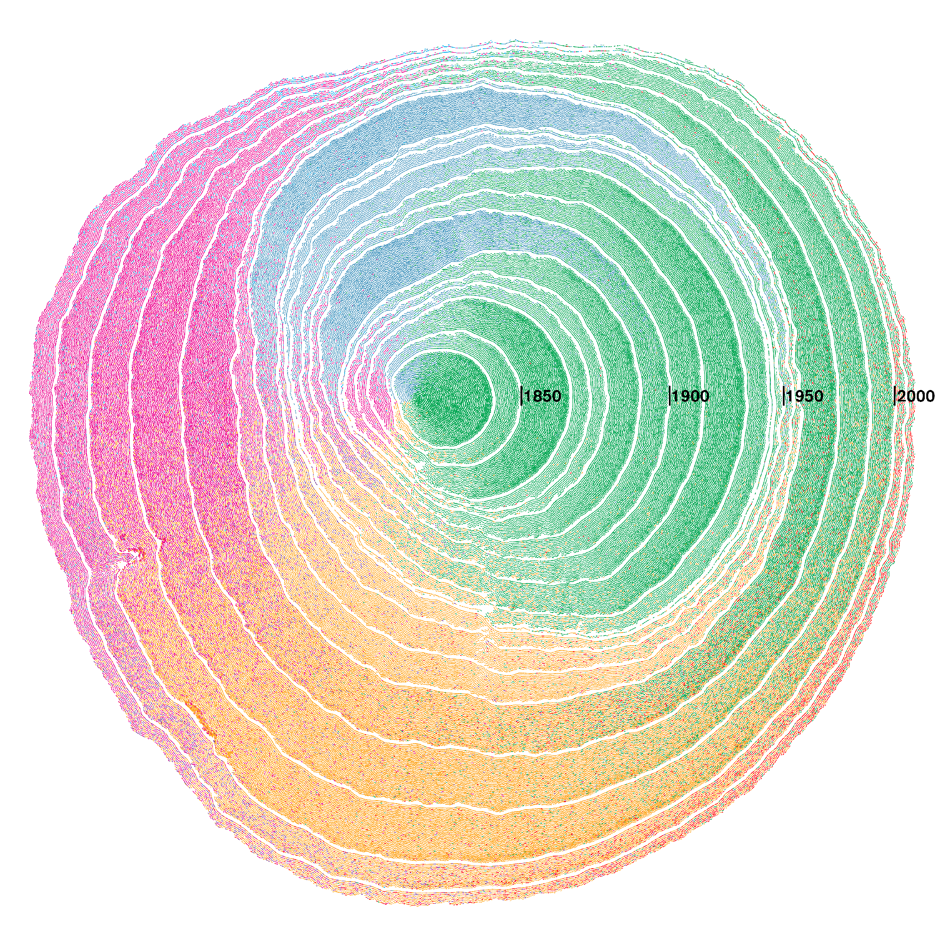
What will you learn in the program?
We’re based in the College of Arts, Media and Design, with core courses in both the School of Journalism and the Department of Art & Design. You can take many diverse electives, too, with other departments. You have a general-access pass across a top-50 research university; Northeastern is among the most innovative educational institutions in the world.
The Media Innovation and Data Communication degree is meant to give you the knowledge to develop stories of many kinds and to think rigorously about media strategy and the uses of technology. Again, you don’t need a technical background. Our goal is to give you the specific competencies and knowledge you need while you’re here. We’ll give you the skills to be a fluent data storyteller and data-driven manager. We also emphasize how bringing a philosophy of innovation to your work can help you chart a dynamic career in media domains and industries.
We have a track record already of empowering many emerging journalists and media makers, sending them out to great co-ops (job opportunities while you are at Northeastern), internships, fellowships, and ultimately full-time jobs in the media industries writ large.
For a sense of what courses look like, check out what the Media Studio courses — lab and capstone courses for our innovators and storytellers — have produced in recent years. Prof. Dan Zedek — former head of design for The Boston Globe and a sought-after digital designer — often runs this course.
- The Emancipator voting rights project launched in July 2022: https://www.bostonglobe.com/opinion/the-emancipator/
- Here are master’s projects from Studio 2: https://mediainnovation.camd.northeastern.edu/2021/masters/
- “Love in the Time of Covid” from 2021: https://mediainnovation.camd.northeastern.edu/2021/loveinthetimeofcovid/
- Master’s projects in 2021: https://mediainnovation.camd.northeastern.edu/2020/
- The 2019 Studio 1 project, “Faces of the Gig Economy”: https://web.northeastern.edu/themargins/gigeconomy/
We also regularly take international reporting trips, led by Prof. Carlene Hempel, pursuing our innovation agenda in a global context. See our latest trip, to Panama: https://beyondthepanamacanal.sites.northeastern.edu/
Here’s our team from that trip, in summer 2022:
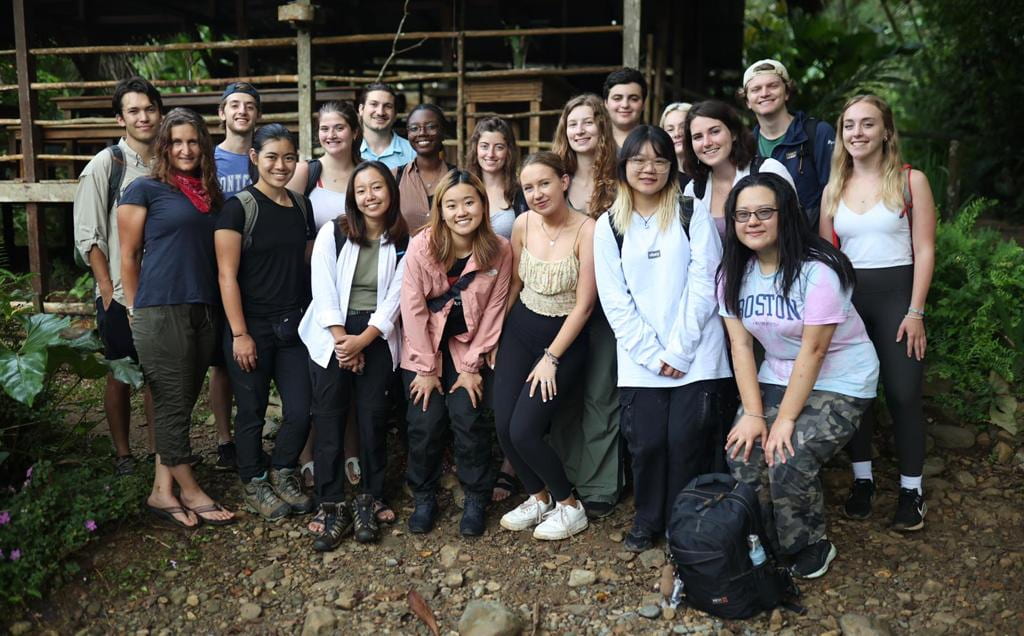
Who are the profs?
We are a small school, but we truly believe we have the best set of faculty for this type of degree in the world. Our professors do research and consult — and do media creation themselves — in a wide variety of areas, from data visualization and video animation to social media and critical analysis of issues of race and gender in media industries.
Meet a few of us:
Rahul Bhargava is an Assistant Professor, educator, researcher, designer, and facilitator who builds collaborative projects to interrogate our datafied society with a focus on rethinking participation and power in data processes.
Mike Beaudet is a Professor of Practice and investigative reporter who has worked in television for more than 20 years. He is a Multimedia Investigative Journalist at WCVB-TV in Boston where he works as part of the “5 Investigates” team. Mike has been leading a national effort, the Reinventing Local TV News Project, to infuse animation and use innovative visual techniques in video storytelling.
Matt Carroll is a Professor of Practice and a Pulitzer Prize-winning data reporter. He oversees two graduate media efforts — Global Observer and The Scope. You may have seen a very good impression of Matt in the Academy Award-winning movie “Spotlight.”
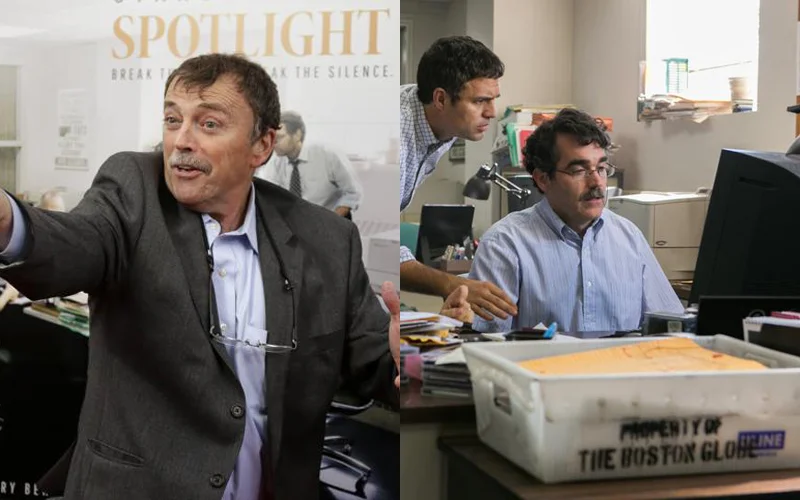
Meredith Clark is an Associate Professor and Founding Director of the Center for Communication, Media Innovation, and Social Change. Her research focuses on the intersections of race, media, and power in digital, social, and news media, and is informed by the years she spent working in newsrooms as an editor, editorial writer, and columnist.
Meg Heckman is an Assistant Professor, journalist, author, and educator focused on building a news ecosystem that is robust, diverse and equipped to serve all segments of society. She’s a leading scholar of gender and news media.
Marcus Howard is an Associate Teaching Professor and an award-winning journalist. His scholarly interests focus on examining the role of media in democratization with an emphasis on race, culture, and social movements.
Jeff Howe is an Associate Professor and leading writer about science and technology issues. A longtime contributing editor at Wired magazine, Jeff coined the term “crowdsourcing” in a 2006 article for that magazine. He is the author of two books about new trends in technology.
Jonathan Kaufman is a Professor, Director of the School of Journalism, a Pulitzer Prize-winning editor and reporter, and an author of several books. He is an expert on global media, with a focus on China. He has held senior positions at Bloomberg News, The Wall Street Journal, and The Boston Globe.
Dan Kennedy is a Professor, author of two books about the U.S. press, and a nationally recognized commentator on news media and politics. His current research project, “What Works,” investigates the future of local news. Within the graduate programs, he teaches ethics and opinion journalism.
Dan Lothian is a faculty member, a former White House correspondent for CNN, and a distinguished broadcaster and media entrepreneur. He runs the media strategy and video consultancy Little Park Media.
Jody Santos is a Teaching Professor and a human rights filmmaker who has traveled to some 30 countries across five continents. She is the founding executive director of the Disability Justice Project.
Jeb Sharp is an Associate Teaching Professor and acclaimed radio and podcast journalist who has led many distinguished shows and projects in the public radio and audio worlds.
How do I get involved?
More information about the program can be found here, where you can also find a link to the application. No GRE is required.
We try to provide generous scholarships and research assistantships, to the extent we are able.
Feel free to reach out to the head of graduate programs, John Wihbey, j.wihbey@northeastern.edu.
